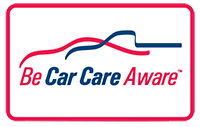The financial benefits of keeping your vehicle long after you have paid it off are significant,” Rich White | Executive Director, Car Care Council
AUTO TECH’S TOP TEN
- Fuel Filter – replace every 2 years/24,000 miles
- Power-Steering Fluid – inspect level with every engine/oil change; top off as needed
- Battery – typically replace every 48 to 60 months
- Air Filter – the air for the engine and airflow sensor has to be free of contaminates, replace airflow components every 12 months/12,000 miles
- Automatic Transmission Fluid & Filter – check the fluid periodically and change the fluid and filter every 2 years or 24,000 miles
- Spark Plugs – replace every 30,000 to 100,000 miles
- Engine & Timing Belts – replace every 3 years/36,000 miles for engine belts or 60,000 to 90,000 miles for the timing belt
- Coolant – the coolant serves as antifreeze and guards against corrosion; replace every 2 years/24,000 miles
- Tires – stick a penny upside down in the grooves and if you see the top of the president’s head, it’s time to replace the tire
- Brakes – monitor the brake fluid level and condition of the pads; replace if safety is compromised
KEEPING YOUR VEHICLE IN TUNE WITH THE ENVIRONMENT
At Auto Tech, reducing, reusing and recycling is important to us and car care is a win-win situation! You not only help the environment, but a properly maintained and operated vehicle will run more efficiently, will be safer and last up to 50% longer. Here’s how to start:
At Auto Tech, reducing, reusing and recycling is important to us and car care is a win-win situation! You not only help the environment, but a properly maintained and operated vehicle will run more efficiently, will be safer and last up to 50% longer. Here’s how to start:
- Keep Engine Tuned – replace filters, fluids and spark plugs as recommended (a misfiring spark plug can effect your fuel efficiency by as much as 30%!)
- Check Tires – under inflated tires and wheels that are out-of-line make the engine work harder (maintained tires will last longer, so there’s fewer to be disposed)
- Check the Air Conditioner – servicing your AC by a certified technician to check for leaks is vital; CFC gases (Chlorofluorocarbons) are associated with the depletion of the ozone layer
- DIYer? – most repair facilities will accept used motor oil, anti-freeze/coolant, tires and old batteries or call your local municipal or county government for recycling sites (never dump used oil or anti-freeze on the ground or in open streams)
- Observe Speed Limits – mileage decreases sharply above 55 mph
- Easy on the Pedal – avoid sudden accelerations and stops; using cruise-control on open highways will keep your speed steady while saving gas
- Clear the Trunk – less weight means better mileage. Store luggage/ cargo in the trunk rather than on the roof to reduce air drag
- Plan Your Stops – make less trips and consolidate your daily errands to eliminate unnecessary driving
- Avoid Heavy Traffic – try to travel when traffic is light for less stop-and-go conditions
- Saving Social – join a carpool and extend the life of your car, emit less emissions and enjoy the company of your coworkers


